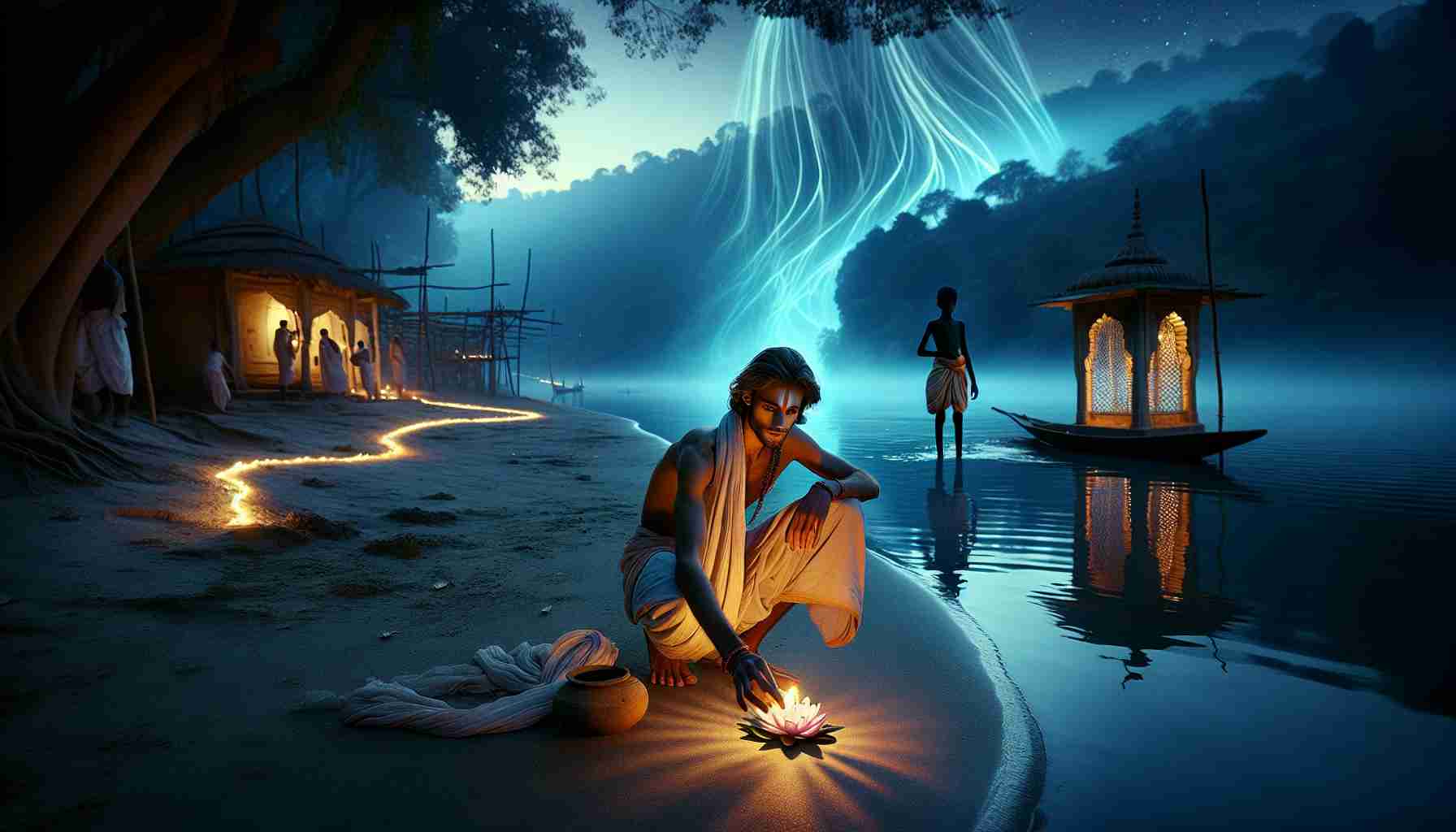

I am Aarav, son of a village priest, born and raised near the banks of the Yamuna. I once thought I was above my father’s prayers and duties, that city lights would erase the shadows inside me. I was wrong.
For seven years, I lived in Delhi, lost in the noise of drink, debts, and wrong choices. I ignored my father’s letters. I sold my mother’s gold chain—her only keepsake from her wedding—for one more temporary escape. When my father passed, I arrived too late for the last rites. His pyre was ashes. My mother didn’t even look at me. She simply said, “Do your pranams, if they mean anything now.”
I returned to our empty ancestral home a month ago, thinking I’d clean it, sell it, and somehow start over. But regret was thick in the walls. His rudraksha beads still rested on the altar. His favorite Bhagavad Gita sat open beside the lamp. I wept then—not for him, but for all the years I chose selfishness over duty.
The next morning, I walked to the river to do tarpana—offering water for the ancestors. My hands shook. Something inside whispered I didn’t deserve even forgiveness, let alone grace.
But that’s when I saw the boy. Maybe eight years old, dressed in dusty shorts, placing small diyas—clay lamps—onto floating lotus leaves. He had no priest’s robe, no chantbook. Just faith. He noticed me watching and smiled.
“For your father?” he asked. I nodded, quiet.
“Put one in the water,” he said. “It goes all the way to Ganga-ji if you believe.”
I laughed softly. “I don’t think my lamp would know the way.”
He placed one in my palm. “The river knows,” he said. “And Bhagavan (the Divine) knows who’s trying.”
In that moment, I remembered a verse my father had once underlined in the Bhagavad Gita: “Even if the most sinful person worships Me with unwavering devotion, he must be regarded as righteous, for he has rightly resolved.” (Bhagavad Gita 9.30)
I kneeled, lit my diya, and released it. I told no story, gave no excuse. I just gave the river what I had.
My legs trembled, not from age, but from the weight falling off. There was no voice from the sky, no vision of gods. Only the warmth of the flame drifting forward, quiet and sure.
That night, I opened my father’s scripture again and found more truth I had missed: “There is no destroyer of karma greater than knowledge.” (Bhagavad Gita 4.38)
I now rise at dawn. I chant softly. I care for my mother’s garden. No one calls me wise. That’s fine. But I know this now: the past breaks us only if we stay buried in it.
My father is gone, but the thread he carried—the thread of dharma (right path)—has found space in my palms again. The boy by the river reminded me.
Grace didn’t wait for me to be perfect.
It met me in my trying.
I am Aarav, son of a village priest, born and raised near the banks of the Yamuna. I once thought I was above my father’s prayers and duties, that city lights would erase the shadows inside me. I was wrong.
For seven years, I lived in Delhi, lost in the noise of drink, debts, and wrong choices. I ignored my father’s letters. I sold my mother’s gold chain—her only keepsake from her wedding—for one more temporary escape. When my father passed, I arrived too late for the last rites. His pyre was ashes. My mother didn’t even look at me. She simply said, “Do your pranams, if they mean anything now.”
I returned to our empty ancestral home a month ago, thinking I’d clean it, sell it, and somehow start over. But regret was thick in the walls. His rudraksha beads still rested on the altar. His favorite Bhagavad Gita sat open beside the lamp. I wept then—not for him, but for all the years I chose selfishness over duty.
The next morning, I walked to the river to do tarpana—offering water for the ancestors. My hands shook. Something inside whispered I didn’t deserve even forgiveness, let alone grace.
But that’s when I saw the boy. Maybe eight years old, dressed in dusty shorts, placing small diyas—clay lamps—onto floating lotus leaves. He had no priest’s robe, no chantbook. Just faith. He noticed me watching and smiled.
“For your father?” he asked. I nodded, quiet.
“Put one in the water,” he said. “It goes all the way to Ganga-ji if you believe.”
I laughed softly. “I don’t think my lamp would know the way.”
He placed one in my palm. “The river knows,” he said. “And Bhagavan (the Divine) knows who’s trying.”
In that moment, I remembered a verse my father had once underlined in the Bhagavad Gita: “Even if the most sinful person worships Me with unwavering devotion, he must be regarded as righteous, for he has rightly resolved.” (Bhagavad Gita 9.30)
I kneeled, lit my diya, and released it. I told no story, gave no excuse. I just gave the river what I had.
My legs trembled, not from age, but from the weight falling off. There was no voice from the sky, no vision of gods. Only the warmth of the flame drifting forward, quiet and sure.
That night, I opened my father’s scripture again and found more truth I had missed: “There is no destroyer of karma greater than knowledge.” (Bhagavad Gita 4.38)
I now rise at dawn. I chant softly. I care for my mother’s garden. No one calls me wise. That’s fine. But I know this now: the past breaks us only if we stay buried in it.
My father is gone, but the thread he carried—the thread of dharma (right path)—has found space in my palms again. The boy by the river reminded me.
Grace didn’t wait for me to be perfect.
It met me in my trying.